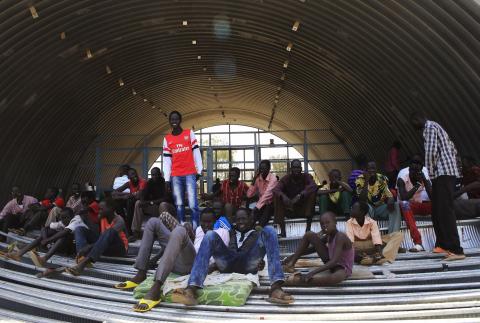Advertisement
Mass Grave Fuels Fears Of Ethnic Bloodshed In South Sudan
JUBA (Reuters) - A mass grave believed to contain the bodies of 75 ethnic Dinka soldiers has been found in South Sudan, the United Nations said on Tuesday, fuelling fears of ethnic bloodletting in the world's newest state.
President Salva Kiir said on Tuesday government troops had retaken control of Jonglei state capital Bor, a key town which last week fell to rebels loyal to former Vice-President Riek Machar, who was sacked by Kiir in July.
U.N. human rights officers discovered the grave in the rebel-held city of Bentiu, capital of Unity state.
"We have discovered a mass grave in Bentiu, in Unity State, and there are reportedly at least two other mass graves in Juba," U.N. High Commissioner for Human Rights Navi Pillay said in a statement in Geneva.
The conflict in South Sudan erupted in the capital Juba on December 15 but has spread to oil-producing regions and beyond, rapidly dividing the two-year-old nation on ethnic lines.
"Targeted attacks against civilians and against United Nations personnel, such as those that have occurred in Juba and Jonglei, could constitute war crimes or crimes against humanity," Adama Dieng, U.N. Special Adviser to the Secretary-General on the Prevention of Genocide, said in a joint statement with Jennifer Welsh, U.N. Special Adviser on the Responsibility to Protect.
Much of the fighting has involved Dinka and Nuer factions of the Sudan People's Liberation Army, with militias and marauding youths also reported to be attacking opposing ethnic groups.
Western powers and east African states, keen to prevent more chaos in a fragile region, have tried to mediate between Kiir, a Dinka, and rebel leader Machar, a Nuer.
Both men say the conflict is political, not tribal, but 40,000 people have sought refuge in the bases of U.N. peacekeepers amid widespread fears of ethnic killings.
"My cousin and nephew were both caught and executed. How can I leave this place?" asked Gatjang, a 29-year-old Nuer, at a U.N. compound in Juba crammed with about 12,000 fearful civilians. "Even here. What if they sneak inside and attack us?"
Kiir on Tuesday said government troops were back in Bor after losing the town on Sunday. "Forces loyal to the government have taken Bor and (are) now clearing whatever forces that are remaining there," he told journalists at his office in Juba.
While both men have said they are open to dialogue, Machar said on Monday he would only negotiate if his detained political allies are released, a demand the government swiftly rejected.
"I am extremely concerned that South Sudan risks spiraling into a disaster for both its own people and the region," the European Union's foreign policy chief Catherine Ashton said on Tuesday. "Such a situation can, and must, be avoided."
OIL OUTPUT SAGS
Pillay urged both sides to protect civilians, saying political and military leaders could be held to account for crimes. "Mass extrajudicial killings, the targeting of individuals on the basis of their ethnicity and arbitrary detentions have been documented in recent days," she said.
Last week Nuer and Dinka soldiers fought at Rubkona army barracks in a village just outside Bentiu. U.N. spokesman Joe Contreras said later that 27 soldiers loyal to Kiir had sought refuge in a U.N. compound near Bentiu after the clashes.
The fighting has hit oil production, the economic lifeline of a government that gets 98 percent of its revenue from oil.
Petroleum Minister Stephen Dhieu Dau told Reuters on Tuesday output had fallen by 45,000 barrels per day to 200,000 bpd after oilfields in Unity state shut down due to clashes.
Troops loyal to Machar control most of Unity state, but officials say government forces still hold the oil fields which are some of the most heavily militarized areas in the country.
The Juba government disclaimed responsibility for the mass grave in Bentiu, saying via Twitter: "Bentiu is currently under the control of the rebel leader Riek Machar - we have nothing to do with that area & the mass killings #SouthSudan."
The U.N. Office for the Coordination of Humanitarian Affairs said the crisis had displaced an estimated 81,000 people, though the real number was likely to be higher.
Hilde Johnson, the U.N. Special Representative of the Secretary-General, said that a previous estimate of 500 dead, made on the third day of the 10-day-old conflict, would rise.
"It is likely that the numbers are much higher than initial calculations but we do not know," she told reporters in Juba.
The U.N. Security Council was due to vote later on Tuesday on a resolution to approve increasing the number of peacekeepers in South Sudan to about 11,800 from 6,800.
South Sudan risks unraveling only two years after it seceded from Sudan in 2011 under a peace deal that ended decades of war in what was formerly Africa's biggest country.
(Additional reporting by Stephanie Nebehay in Geneva; writing by Drazen Jorgic; Editing by Alistair Lyon and David Evans)



















Add new comment